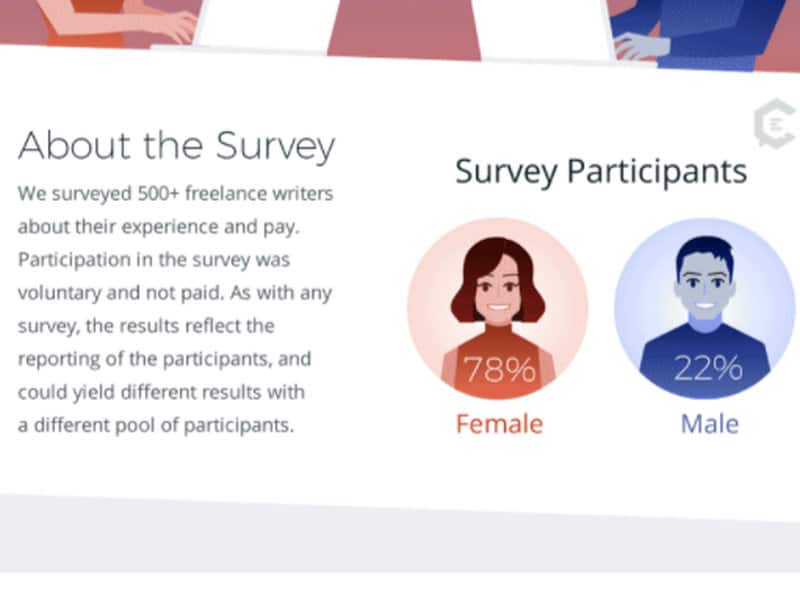When I first started as a freelance writer, I definitely had imposter syndrome at work.
When a certain freelance writing client hired me to write blog content, I noticed other writers (the ones I looked up to) also writing for this client and I immediately felt like a huge fraud.
Learning how to deal with imposter syndrome at work would settle in and I had a very hard time writing for this client.

Why did I get this freelance writing job when they had popular amazing writers writing for them?
I was too much in my head and did not feel confident.
Fortunately, in the end, the client had nothing but high praise for my content and gave me a glowing testimonial. They treated me as if I was a professional and valuable writer.
It was at this moment that I realized that it was okay to start believing in ME and my ability.
But getting to that place of confidence isn’t always easy. Having to learn how to overcome imposter syndrome at work can be difficult for many freelancers – especially women.
Research has shown the majority of manager-level or higher level corporate positions are filled by men. When we as women don’t see other women as directors, CEO’s, or presidents succeeding, we doubt ourselves as equally capable workers.
Another study found that 75% of women have experienced imposter syndrome at some level of their career.
And, according to Clearvoice, 78% of freelance writers are women.

So, what does that mean?
If you are a freelance writer, you’re probably a woman and you probably experienced imposter syndrome anxiety.
Know that this happened to me and I came out the other side more confident and capable of my service and I know you can too!
What is Imposter Syndrome?
Imposter syndrome, in a nutshell, is a person’s inability to recognize and believe that their success is deserved and achieved as a result of efforts or skills.
One of the major struggles those with imposter syndrome face is feeling like a fraud.
They think their accomplishments are due to luck or super-hard work instead of ability and are afraid other people will figure out that they aren’t really talented.
Which, of course, is absolutely not true!
In this fear of being discovered as a fraud, people will go through hoops to complete a project perfectly and, when they succeed, they attribute that success to effort and anxiety.
Ultimately, they believe this hard work will cover up their lack of talent but they will exert their efforts privately, downplaying these efforts as, “common knowledge,” or skills that come, “naturally.”
Sometimes, those who deal with imposter syndrome may also try to use charm to win the approval of clients because they don’t feel their work and skills are good enough.
The problem is, even if they get this approval, they still don’t believe they deserve it.
In the end, many people with imposter syndrome just stop trying altogether. They do this to avoid the possibility of failing.
Does this sound like you?
Are these challenges getting in your way when it comes to being a successful freelancer?
How to Deal with Imposter Syndrome at Work

Anyone in any walk of life can experience imposter syndrome but it’s especially prevalent amongst freelance writers.
Why is this?
Apart from the majority of freelance writers are women, freelancers have to build their careers on relationships and connections.
Because of this, it can become easy to define one’s success by outside factors instead of actual skills and competency.
Oftentimes, freelance writers define their success by having the “right story” at the“right time” for the “right client.”
It’s no secret that the world of freelance writing involves latency periods of no work, so this lack of consistency paired with success can lead some people to believe that it’s all luck.
Add on top of that the fact that writers work from home solo and can often feel socially isolated from the rest of the world.
The lack of a social work setting also makes it difficult to receive positive feedback on a regular basis.
It’s harder to get validation and praise from clients when you work on your own.
All of these factors can easily lead freelancers to experience imposter syndrome. If this is you, then what can you do about it?
Imposter Syndrome: How to Deal With It
1. Power Pose
Social psychologist Amy Cuddy conducted a study and found that feeling in control and creating a sense of power by holding “power poses” for two minutes can increase testosterone and decrease cortisol levels.
This, in turn, creates a sense of power that can help you deal with imposter syndrome.
When you’re not feeling confident about your writing skills, try doing a full-body stretch before you sit down at your computer.
You can also try holding the “Superman” or “Wonder Woman” pose for two minutes by standing up straight, holding your shoulders back, sticking out your chest, and placing your hands on your hips.

2. Reframe Your Thinking
Another way to deal with imposter syndrome is to reframe the way you think about your achievements – especially when freelance writing gigs dry up.
By reframing the situation, you can balance out the doubts you have about your abilities.
Try to list the positive things that have happened recently, such as praise from a client and the collaborative relationship you have formed with them.
I personally like to have a “smile file” of past praise from clients.
Because, even if jobs slow down for a while, those clients keep coming back – and for good reason! (P.S. Because you’re good at what you do.)
Focus on the fact that you continue to get writing jobs so you are obviously doing something right.
3. Be Realistic
Take a minute to look at your freelance writing portfolio – every piece you have in there has been earned.
Think about the praise you’ve received from clients – you’ve earned that recognition.
Despite the doubt that imposter syndrome plants in your mind, you have evidence to prove your skills and competency as a freelance writer.
You can’t fake those accomplishments!
Clients are paying you to provide a service and they aren’t doing so just to throw money around. If they truly weren’t happy with the results you provided, they would say so.
Just the fact that they keep hiring you is proof that you’re doing a great job!
And when writing clients do give you positive feedback, don’t shy away from it or brush it off. Say “thank you” and be proud to tuck that feather in your cap!
Simply showing your appreciation will rewire your brain to accept compliments and boost your self-esteem.
Be realistic about your successes and allow yourself to be proud of them!
4. Try Confidence-Boosting Affirmations

The practice of saying affirmations has been shown to rewire your brain and can help you combat imposter syndrome.
Affirmations are simple statements that challenge your negative beliefs about yourself.
Affirmations can be individualized to meet your needs and can be a powerful tool in changing the way you think in behave.
Some examples of powerful affirmations are:
- “I’ve earned my success.”
- “I am worthy of my success.”
- “I am capable as a freelance writer.”
- “I do not have to be perfect to be successful.”
- “I am valuable as a freelance writer.”
- “My hard work pays off because of my skills and talent.”
- “I am proud of my achievements.”
Try writing out phrases like these and posting them around your workspace. The next time you start feeling like you’re a phony or a fraud, repeat them out loud.
You’ll be surprised how quickly your mindset can change!
5. Be Okay With Not Knowing It All
Brené Brown is a research professor who dedicates her time to studying psychological phenomena such as vulnerability, shame, and guilt.
She talks a lot about “perfectionism” which she describes as a 20-ton shield that, instead of protecting us, only weighs us down.
A lot of the time, freelance writers with imposter syndrome feel like they have to produce “perfect” results, which links to what I mentioned earlier about exerting maximum effort to cover up the perceived sense of having no talent.
The truth is, you are allowed to accept “good enough” as a measure of your results.
While you should always strive as a freelance writer to produce high-quality content, you don’t need to weigh yourself down with the idea of achieving “perfection.”
And focusing on perfection takes your attention away from recognizing genuine praise for your skills and talents. It’s important to appreciate the fruits of your hard work and celebrate your achievements.
6. Take a Course
If you still don’t feel like your freelancing writing skills are up to snuff, you can always take an online course to boost your knowledge and confidence.
Having a certificate of achievement may also be the visual reminder you need to feel confident that you have the right stuff when it comes to being a freelancer.
My courses, such as WriteTo1K, are designed to walk you through the process of learning the craft and landing clients so you can make money writing.
So it’s not just all about gaining knowledge – you’ll also experience success along the way!
7. Connect With Other Freelancers
You are not alone when it comes to dealing with imposter syndrome and feeling like a fraud.
Imposter syndrome is a universal feeling and is felt more as a freelance writer.
Connecting with peers and professionals in the field of freelancing can help – even if you can’t meet with them in person.
You can surround yourself with people who understand the struggles of freelancing and imposter syndrome as deeply as you do.
Plus, you can always lean on them for support when it comes to validating your skills and talents.
Have them look at pieces before you send them to a freelance writing client. You may receive some constructive feedback but, overall, the freelancing community is extremely warm and welcoming!
Finding people who understand your struggle will help you feel seen and also help you understand that you are not a fake or a fraud – we can’t all be!
8. Charge What You’re Worth

I know a huge struggle for freelancers is setting their freelance writing rates.
Most will undercut themselves to seem more appealing to clients by charging low rates that do not at all reflect their level of skill.
If you charge too little, you’re selling yourself short. However, if you price higher, you may feel that you’re not worth what you’re charging – which doesn’t help to deal with imposter syndrome if a potential writing client walks due to your rates.
This is when having a freelancing community comes in handy. You can always ask a mentor or other freelancer to look at what a potential client is asking and compare it to the price you were thinking of charging them.
An outside perspective can help you determine what your skills and talents are actually worth!
It’s also helpful to remember that clients are willing to pay for high-quality results. The reason they are seeking your services in the first place is that they don’t have the time or skills (or both) to complete the project.
They want to pay you, receive the product, and be done – and they’re willing to pay for that convenience.
While it can be difficult to know what to charge when you are first starting out as a freelancer, know that as you build up experience, a writing portfolio, and referrals, you need to consider charging more for your writing services.
9. Treat Freelancing Like a Business
Do you know what I love to do on lazy days?
Wear my pajamas from sun-up to sun-down. Not only is it super comfortable but it tells my brain that it’s okay to relax and not be at all productive.
However, when it’s time to get to work on my freelancing projects, this doesn’t cut it.
If you want to start taking yourself seriously as a freelance writer, you have to start treating your career seriously too by acting like your job is a business and establishing the same expectations for yourself as you would in a workplace.
That means getting cleaned up and dressed in the mornings.
It means taking breaks throughout the day. It means putting away social media and distracting conversations so you can focus on your work.
This may sound strict but doing so will not only make you feel more professional and legit but it will power-boost your productivity as well!
I know full-time freelancers who started out working in their jammies all hours of the day. At times, they would look at their working style and question whether or not what they were doing was deserving of the money they were making.
In short, they felt like frauds.
Once they started a routine such as getting dressed in the morning and establishing their work hours, those feelings of imposter syndrome went away!
They felt more productive and professional as well as more confident in their work and successes.
10. Give Yourself Time
Whether you’ve been a freelance writer for a while or are just fresh to the scene, it always takes time to get comfortable and find your stride.
This really applies to anything you do!
Just like you shouldn’t overwork yourself to be perfect, you should also avoid the temptation to become an expert overnight.
Trust me, I’ve been doing this a long time and I’m still learning!
The truth is that you will grow into your comfort zone when it comes to freelancing over time and someday you’ll look back and realize how much less doubtful you feel about your skills and talents.
Keep in mind, though, that even seasoned freelancers experience self-doubt about our capabilities and worth.
It’s just that, as our confidence grows, we become more comfortable seeing ourselves as experts and professionals.
Don’t Give Up! You’ve Got This!

Imposter syndrome is something that builds up over time to the point where it becomes deeply ingrained in your psyche.
It can be a slow and steady process to get over it, but I know you can do it!
Taking small steps, such as the ones I listed above, is the key to overcoming imposter syndrome once and for all.
Just don’t rush it, though – taking your time to deal with it is going to give you a stronger sense of self-confidence when you come out the other side.
Now I want to hear from you – Have you ever dealt with imposter syndrome?
What do you do to overcome it? I’d love to hear your stories!




11 Comments